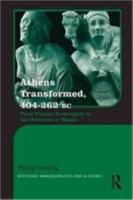
Routledge (2015) h/b 186pp £85 (ISBN 9780415973925)
H. has no time for those who argue that Athens’ democratic Assembly was an irrational rabble, or that it needed slaves in order to function as a democracy in the first place. His thesis is that, from the invention of democracy in 508 BC to its demise in 322 BC at the hands of the northern power Macedon, the poor in Athens, through the Assembly, enjoyed ‘unprecedented dominance in both domestic and foreign politics’. Rather like Ober’s analysis in his Rise and Fall of Classical Greece (reviewed elsewhere on this site), he finds much to admire in the dynamism generated by people-power. But from 322 BC, the world of Athens was changed for ever: people-power was at an end, and the rich ruled the roost.
One pedantic quibble: H.’s aim is to ‘try’ to adhere to the Greek spelling of proper names, but we get e.g. the very unGreek Plato, Plutarch, Aristotle, Philip and Alexander, Greek ‘u’ appearing as ‘u’, ‘y’ and ‘v’, chi appearing as ‘kh’ and ‘ch’, no distinction between long and short ‘e’ and ‘o’, and italicised Greek words with English plurals, e.g. symmories and kleroukhs, and Diadokhi with a Latin plural.
H. begins by showing that the anti-democratic coup of the Thirty in 404 BC was a failure because of the strong support across the classes—slaves and resident aliens included—for the radical, people-led democracy which was largely paid for by the financial demands made on the wealthy. He then sketches the main features of that unique system—law-making by, and payment for attendance at, the Assembly, the accountability of the executive, trial by jury, state pay for officials and other disbursements, e.g. allowances for the handicapped, subventions for the poor to attend state festivals and so on. He stresses the lively range of active local and family businesses and the importance of the Peiraieus: in moving from being an aristocratic land-based city-state to one where marine enterprise flourished and so the sailor/rower was king, Athenians made it clear to the rich that if they wanted power, they had better listen to, and put they cash behind, the poor who now underpinned the show.
Here H. might have emphasised the element of healthy competition which this system generated: in Assembly, the rich competing to win the vote of the poor; in festivals, competition beween playwrights, poets, musicians, and orators, all funded by the rich, but the result dependent on the people’s decision. Aristotle would have approved, since he reckoned that the more people involved in judging an issue, the more reliable the final outcome.
There follows an historical account of Athens’ maintenance of their democracy during the 4th C BC until its loss in 322 BC after the Macedonian takeover. This was accompanied by further population decline, especially of those seeking work e.g. in the armies of the new Hellenistic monarchs. H. then contrasts the way in which finance was raised during the democratic period—e.g. public-private partnerships over mining leases, taxes on goods going through the Peiraieus, taxes on the rich to cover the costs of war and state festivals, and so on—with what happened subsequently: the replacement of organized, obligatory taxes on the wealthy with voluntary donations and benefactions, taking the power away from the poor and placing it in the hands of the rich.
Commendably, H. has decided to write for the layperson, eschewing scholarly paraphernalia, especially footnotes. The problem (expertus dico) is that Greek history involves far too many players—all those little Greek city-states battling it out, with constant interventions from the big boys Persia and then Macedon—and, without a single focal point from which to reflect what is happening, it all becomes very complicated and name-heavy. H.’s solution is a detailed historical time-line as an appendix. The layperson will have to decide whether that solves the problem. Likewise, H. wants to give the layperson some insight into the nature of the sources, and another appendix discusses official documents, the historians, the nature of comedy, rhetoric, and so on. This again is well done, but it is rather hard to see what use it is, given the nature of the text.
But whether H. has succeeded in his ambition of writing for the layperson or not, the central thesis is a most stimulating one.
Peter Jones
